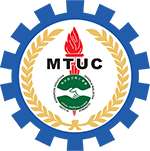Malaysia is one of Asia's biggest employers of foreign labour. But recently, cases of deaths, abuse and forced labour have come to light. What is going on? Who is protecting these migrant workers?
Objecting the latest development, the Pesticide Network Asia and the Pacific
(PAN-AP) urged the government to reconsider its decision to review the ban due
to the serious implications it would have on the health of plantation workers.
<p>The review was announced by Agricultural and Agro-Based Industries Minister
Muhyiddin Yassin, who said the decision was made following ‘presentations’ by
small-holders and key industry players.</p>
<p>"It is crystal clear that the minister had caved in to the pressures and
persuasions of these ‘small-holders’ and ‘key’ industry players," responded
PAN-AP executive director Sarojeni V Rengam in a statement.</p>
<p>"We were the first country in Asia to announce the ban. The decision was
taken by consultation with the different ministries based on human health concerns
and because of available alternatives. What a shame that now the government
has gone back on its word," she said.</p>
<p><b>Reputation at stake</b></p>
<p>Paraquat is the most important product of Swedish company Syngenta, the world’s
largest agrochemical company.</p>
<p>Identified by the World Health Organisation (WHO) as one of the leading contributors
to Acute Pesticide Poisoning (APP), it has been classified by the organisation
as a Class II (highly hazardous) pesticide. In Malaysia, it has been given a
higher classification of Class I (extremely hazardous).</p>
<p>On Aug 27, 2002, the government announced its decision to ban the use of paraquat
which included rejecting all applications for its registration or re-registration
and phasing out of currently registered products such as Syngenta’s Gramoxone.
The availability of cost efficient and less hazardous alternatives were cited
to justify the decision.</p>
<p>With regard to the current situation, PAN-AP demanded that the ministry review
the outcome of several consultative sessions held with various quarters such
as the Health Ministry, workers and NGOs which eventually led to the ban in
2002.</p>
<p>Using Golden Hope plantation as an example, they also stated that the use of
paraquat is not necessary and that alternatives have already been identified
and used by companies in the plantation sector.</p>
<p>Another issue mentioned was the possible repercussions the issue could bring
to Malaysia’s international reputation.</p>
<p>"When the ban was announced in 2002, NGOs, public interest groups, doctors
and medical associations in Malaysia and other parts of the world had applauded
the Malaysian government’s decision to ban and phase out the use of paraquat.
Now Malaysia’s reputation in the eyes of the world is at stake," said Sarojeni.
Address: Wisma MTUC,10-5, Jalan USJ 9/5T, 47620 Subang Jaya,Selangor | Tel: 03-80242953 | Fax: 03-80243225 | Email: sgmtuc@gmail.com.com
